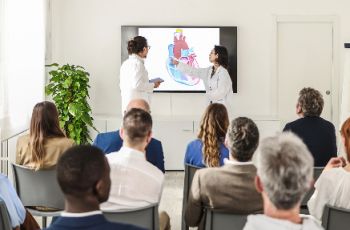Curriculum Details
Core Courses
Required 11 Courses
- HFR 8101 — Interprofessional Collaboration in Practice
-
This course analyzes the core competencies and skills needed to participate effectively in team-based care for patients and populations. Emphasis on communication and flexible leadership strategies and the impact of interprofessional practice on health delivery practices and outcomes. Restricted to SMHS students.
- HFR 8102 — HP Practicum I
-
Supervised integration and implementation of educational or clinical health professional leadership in the student’s practice environment. Completion of 9 credits in HFR courses required prior to enrollment. Prerequisite: HFR 8107.
- HFR 8103 — HP Practicum II
-
Supervised integration and implementation of educational or clinical health professional leadership in the student’s practice environment. Prerequisite: HFR 8102.
- HFR 8107 — Program Theory and Health Innovations
-
Program theory as the basis for designing health and educational innovations that can be tested using scientific methods, replicated in practice, and used to inform policy. Restricted to students in the doctor of health sciences program.
- HFR 8116 — Academic and Clinical Leadership in the HP
-
This course builds the skills needed to serve as a clinical or academic leader in the health professions. Students learn how to think strategically and align goals and resources to prepare health care professionals to serve as effective providers in evolving contexts. Restricted to SMHS students.
- HFR 8203 — Bioethical Implications of Health Research
-
The purpose of this course is to emphasize the critical roles of ethics theories and bioethics principles in the planning, conduct, and dissemination of scientific studies. Topics covered will include scientific and academic integrity, protection of human participants in research, conflicts of interest and commitment, ownership of data and intellectual property, whistleblowing and dispute resolution, and privacy and confidentiality. Restricted to students in the doctor of health sciences program. Credit cannot be earned for this course and THS 8203.
- HFR 8270 — Research Methods in the Health Professions I
-
Students design research and study methods to address gaps in the body of health science knowledge.
- HFR 8271 — Research Methods in the Health Professions II
-
This course is a continuation of HFR 8270. Students are prepared to manage data and conduct quantitative analyses to test hypotheses and support decision making.
- HFR 8996 — Seminar I
-
This is the first in a series of 3 courses related to scholarly inquiry for students in the DHSc program. Students construct a significant problem statement, identify key terms, and conduct an extensive literature review relevant to the gap in the health science educational or clinical practice addressed by the problem statement, and generate a research question. Students will create a research protocol.
- HFR 8997 — Seminar II
-
This is the second in a series of 3 courses related to scholarly inquiry for students in the DHSc program Following IRB approval, the student will collect, and analyze data related to the research question. Students manage data to assure quality, integrity, confidentiality and accuracy.
- HFR 8998 — Seminar III
-
This is the third in a series of 3 courses related to scholarly inquiry for students in the DHSc program. Students interpret the results of the data analysis in relation to the research question and draw conclusions based on the interpretation of the results. Students draft a manuscript for submission to a peer reviewed journal based on the work completed in Seminars I through III.
Concentrations
Choose Your Track:

Clinical Practice
Leadership in Health Professions
Choose 3 Courses
- HCQ 6200 — Introduction to Health Care Quality
-
An overview of the U.S. health care system and the influence of health policy development and implementation on health care quality. Introduction to fundamental concepts of health care quality, patient safety, leadership, and change management. Applicants of the MSHS in Health Care Quality program may use the Certified Professional in Healthcare Quality (CPHQ) credential as an accepted equivalent.
- HCQ 6206 — Health Information, Quality and Outcomes
-
Approaches to medical informatics to support managerial decision making, patient care, and quality improvement in clinical practices. Ethical, legal, and social dimensions of health care information technology.
- HFR 8314 — Health Care Research
-
Skills needed for planning and implementation of health care research within clinical institutions; institutions and regulatory requirements for health care research including those involving human subjects. Prerequisites: CML 6203 and HFR 8116.
- HFR 8313 — Knowledge Translation in Health Care
-
Examination of the emerging field of knowledge translation, which integrates knowledge across the domains of translational research, implementation and dissemination science, and collaboration and team science within the context of current health practice and legislation.

Educational Practice
Leadership in Health Professions
Choose 3 Courses
- HFR 8212 — Teaching Strategies in the Health Professions
-
Application of teaching and learning principles in the delivery of education in health professions; practices grounded in andragogy, contributing to curriculum program development, and the enhancement of teaching and assessment skills. Restricted to SMHS students. Recommended background: Experience in health care or practice as a health care professional.
- HFR 8213 — Curriculum Development in the Health Professions
-
Curriculum development and assessment skills in medical and health science settings. Restricted to SMHS students. Recommended background: experience in health care or practice as a health care professional.
- HFR 8214 — Assessment in HP Education
-
Skills needed to effectively assess individual achievement of required clinical competencies and implement a comprehensive assessment of course and program goals. Prerequisites: HFR 8212 and HFR 8213.
- HFR 8215 — Technology and Education in the Health Profession
-
Students design, develop, implement and assess technology-based education approaches for the health profession. Prerequisites: HFR 8212 and HFR 8213.
Electives
Choose 2 Courses (one must be a research elective)
- COHM 6220 — Finance for Health Care Operations
-
Applied health economics, finance and policy for high-quality, value-based health care operations; costs, expenditure, and reimbursement of services; strategic financial planning tools. Restricted to students in the clinical operations and health care management program.
- COHM 6245 — Strategic and Operational Decision Making for HealthCare Leaders
-
Overview of business principles related to healthcare systems and leadership, focusing on strategic management of health care service delivery in various settings.
- HFR 8123 — Qualitative Methods for the Health Professions
-
Introduction to qualitative methods used in the generation and analysis of data relevant to health professionals. Prerequisites: HFR 8270 or HSCI 6270 or the advisor's approval. Credit cannot be earned for this course and THS 8123.
- HFR 8272 — Mixed Methods Research in Translational Health Sciences
-
Introduction to mixed methods as a legitimate design tradition, with a unique set of procedures for data collection, analysis, and strategies to assure rigor and accuracy. Students design a study to address a translational research question.
- HFR 8227 — Survey Methods in the Health Professions
-
This course focuses on the theory and practices behind survey research, including the design and application of survey methods in health professions research. Topic areas covered include but are not limited to writing survey questions, designing and testing the survey instrument, sampling and the procedures for administering a survey, and processes for collecting reliability and validity evidence.
- HSCI 6297 — Independent Study for Health Professionals
-
Independent study involving analysis of a clinical topic, a patient education project, or an on-site mentored clinical research practicum.
- THS 8127 — Systematic Reviews of Health Care Innovations
-
Students refine skills in developing a systematic review of the literature for healthcare innovations, including interventions, educational programs, and products. Restricted to students in the PhD in translational health sciences program or with permission of the instructor. Recommended background: Experience in quantitative research design.

I chose the GW DHSc program to expand my knowledge and abilities to be an educational scholar, effective instructor, and leader in higher education. The program is very practical as I did not have to put my professional goals on-hold. I continuously applied the coursework to meet and exceed my professional objectives which kept me engaged and wanting to know more."
- Marisa Birkmeier, DPT, DHSc